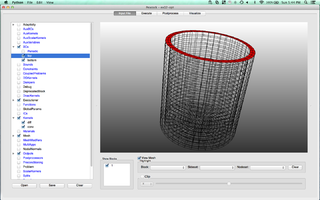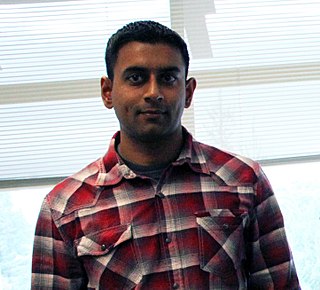Related Research Articles

Nvidia Corporation is an American multinational technology company incorporated in Delaware and based in Santa Clara, California. It is a software and fabless company which designs graphics processing units (GPUs), application programming interface (APIs) for data science and high-performance computing as well as system on a chip units (SoCs) for the mobile computing and automotive market. Nvidia is a dominant supplier of artificial intelligence hardware and software. Its professional line of GPUs are used in workstations for applications in such fields as architecture, engineering and construction, media and entertainment, automotive, scientific research, and manufacturing design.

A rootkit is a collection of computer software, typically malicious, designed to enable access to a computer or an area of its software that is not otherwise allowed and often masks its existence or the existence of other software. The term rootkit is a compound of "root" and the word "kit". The term "rootkit" has negative connotations through its association with malware.
Reiser4 is a computer file system, successor to the ReiserFS file system, developed from scratch by Namesys and sponsored by DARPA as well as Linspire. Reiser4 was named after its former lead developer Hans Reiser. As of 2021, the Reiser4 patch set is still being maintained, but according to Phoronix, it is unlikely to be merged into mainline Linux without corporate backing.
John R. Mashey is an American computer scientist, director and entrepreneur.
The landscape for instant messaging involves cross-platform instant messaging clients that can handle one or multiple protocols. Clients that use the same protocol can typically federate and talk to one another. The following table compares general and technical information for cross-platform instant messaging clients in active development, each of which have their own article that provide further information.

Theodore (Ted) Yue Tak Ts'o (曹子德) is an American software engineer mainly known for his contributions to the Linux kernel, in particular his contributions to file systems. He is the Secondary developer and maintainer of e2fsprogs, the userspace utilities for the ext2, ext3, and ext4 filesystems, and is a maintainer for the ext4 file system.

A free and open-source graphics device driver is a software stack which controls computer-graphics hardware and supports graphics-rendering application programming interfaces (APIs) and is released under a free and open-source software license. Graphics device drivers are written for specific hardware to work within a specific operating system kernel and to support a range of APIs used by applications to access the graphics hardware. They may also control output to the display if the display driver is part of the graphics hardware. Most free and open-source graphics device drivers are developed by the Mesa project. The driver is made up of a compiler, a rendering API, and software which manages access to the graphics hardware.
David Ross Cheriton is a Canadian computer scientist, mathematician, billionaire businessman, philanthropist, and venture capitalist. He is a computer science professor at Stanford University, where he founded and leads the Distributed Systems Group.

Mercurial is a distributed revision control tool for software developers. It is supported on Microsoft Windows and Unix-like systems, such as FreeBSD, macOS, and Linux.

Pichai Sundararajan, better known as Sundar Pichai, is an Indian-American business executive. He is the chief executive officer (CEO) of Alphabet Inc. and its subsidiary Google.
Kevin R. Harvey is an American businessperson and venture capitalist. He is a founder and general partner at Benchmark Capital.

Jeffrey Adgate "Jeff" Dean is an American computer scientist and software engineer. Since 2018, he is the lead of Google AI, Google's AI division.
Khaled El Emam is a co-founder and Director at Replica Analytics. El Emam is also a senior scientist at the Children's Hospital of Eastern Ontario (CHEO) Research Institute and director of the multi-disciplinary Electronic Health Information Laboratory, conducting academic research on de-identification and re-identification risk. As of 2022, El-Emam has served as Editor-in-Chief of JMIR AI, a journal focused on research and applications for the health AI community.

MOOSE is an object-oriented C++ finite element framework for the development of tightly coupled multiphysics solvers from Idaho National Laboratory. MOOSE makes use of the PETSc non-linear solver package and libmesh to provide the finite element discretization.

Arvind Narayanan is a computer scientist and a professor at Princeton University. Narayanan is recognized for his research in the de-anonymization of data.
Andy Rachleff is a co-founder and Executive Chairman of Wealthfront. He had previously been the executive chairman of the company after stepping down as the CEO, but then returned to the CEO role on October 31, 2016. Rachleff co-founded Benchmark Capital in 1995 and was a general partner until 2004. Prior to Benchmark, Rachleff was a general partner with Merrill, Pickard, Anderson & Eyre.

Parrot OS is a Linux distribution based on Debian with a focus on security, privacy, and development.
Snap Inc. is an American camera and social media company, founded on September 16, 2011, by Evan Spiegel, Bobby Murphy, and Reggie Brown based in Santa Monica, California. The company developed and maintains technological products and services, namely Snapchat, Spectacles, and Bitmoji. The company was named Snapchat Inc. at its inception, but it was rebranded Snap Inc. on September 24, 2016, in order to include the Spectacles product under the company name.
Comparison of user features of messaging platforms refers to a comparison of all the various user features of various electronic instant messaging platforms. This includes a wide variety of resources; it includes standalone apps, platforms within websites, computer software, and various internal functions available on specific devices, such as iMessage for iPhones.
References
- ↑ "Vijay P". www.vijayp.ca. Retrieved 2023-03-16.
- ↑ "Vijay Pandurangan – EIR at Benchmark". www.vijayp.ca. Retrieved 2016-10-21.
- ↑ "Vijay Pandurangan: Executive Profile & Biography - Businessweek". www.bloomberg.com. Retrieved 2016-10-21.
- ↑ Ganger, G. R.; Khosla, P. K.; Bakkaloglu, M.; Bigrigg, M. W.; Goodson, G. R.; Oguz, S.; Pandurangan, V.; Soules, C. A. N.; Strunk, J. D. (2001-01-01). Survivable storage systems. DARPA Information Survivability Conference Amp; Exposition II, 2001. DISCEX '01. Proceedings. Vol. 2. pp. 184–195 vol.2. CiteSeerX 10.1.1.23.6643 . doi:10.1109/DISCEX.2001.932171. ISBN 978-0-7695-1212-9. S2CID 15922958.
- ↑ Lynley, Matthew (9 July 2015). "An Interview With Alex Roetter, Twitter's Head Of Engineering". TechCrunch. Retrieved 2016-10-21.
- ↑ "Improving communication across distributed teams | Twitter Blogs". blog.twitter.com. Retrieved 2016-10-21.
- ↑ "The unsung hero of meetings at Twitter is Google Hangouts". Fortune. 2015-09-04. Retrieved 2016-10-21.
- ↑ Nbn; Security; Science; Cisco; Google; People don't want big OpenFlow deployments, so let's do small ones; authentication, Don't take a Leaf out of this book: Nissan electric car app has ZERO; MWC, NFV players push their wares to mobile operators at. "Confused by crazy crashes? Check your Linux kernel virtual Ethernet code". The Register . Retrieved 2016-10-21.
{{cite web}}:|last5=has generic name (help) - ↑ Truong, Alice. "More proof that Twitter is a sinking ship". Quartz. Retrieved 2016-10-21.
- ↑ "The 2 guys who led Twitter's biggest product launch in years are no longer at the company". Business Insider. Retrieved 2016-10-21.
- ↑ "Benchmark hires Vijay Pandurangan | PitchBook News" . Retrieved 2016-10-21.
- ↑ Pandurangan, Vijay. "The Key to Snapchat's Profitability: It's Dirt Cheap to Run". WIRED. Retrieved 2016-10-21.
- ↑ https://explorecourses.stanford.edu/search?academicYear&catalog&collapse&filter-coursestatus-Active=on&page=0&q=biods%2B253&view=catalog.
{{cite web}}: Missing or empty|title=(help) - ↑ https://apcari.ca/2022/11/14/14th-annual-apcari-fall-symposium-2022/.
{{cite web}}: Missing or empty|title=(help) - ↑ https://www.youtube.com/watch?v=gZsz_hrFFTo.
{{cite web}}: Missing or empty|title=(help) - ↑ "Poorly anonymized logs reveal NYC cab drivers' detailed whereabouts". Ars Technica. Retrieved 2016-10-21.
- ↑ Hern, Alex (2014-06-27). "New York taxi details can be extracted from anonymised data, researchers say". The Guardian. ISSN 0261-3077 . Retrieved 2016-10-21.
- ↑ "Sticky data: Why even 'anonymized' information can still identify you". The Globe and Mail. Retrieved 2016-10-21.
- ↑ Franceschi-Bicchierai, Lorenzo (28 January 2015). "Redditor cracks anonymous data trove to pinpoint Muslim cab drivers". Mashable. Retrieved 2016-10-21.
- ↑ Trotter, J.K. "Public NYC Taxicab Database Lets You See How Celebrities Tip". Gawker. Retrieved 2016-10-21.
- ↑ "Giving Google Your Mobile Number Could Make Your Gmail Account Less Secure, Expert Warns". The Huffington Post. 2016-10-21. Retrieved 2016-10-21.
- ↑ Condliffe, Jamie. "The Evolution of Movie Poster Colors, Visualized". Gizmodo. Retrieved 2016-10-21.
- ↑ "The History Of Movie Posters Shows Our Changing Color Bias Over Time". Complex. Retrieved 2016-10-21.